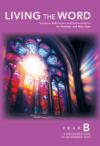Scripture Study for
Ascension of The Lord
Acts 1:1–11 / Psalm 47:6 / Ephesians 1:17–23 / Matthew 28:16–20
<< Back to LECTIONARY RESOURCES
Understanding the Word
By Br. John R. Barker, OFM
Luke begins his story of the gospel’s spread with the conclusion of the earthly ministry of Christ. In this account of the Ascension one notices the centrality of the Holy Spirit, whose bestowal will allow the apostles to continue Jesus’ work. This Spirit-informed proclamation will be the way that Jesus brings about Israel’s hoped
for restoration, yet go beyond Israel to restore all peoples. Although the apostles did not witness the Resurrection itself, they do witness Jesus’ ascension, confirming in their sight that Jesus is the Messiah of God, never to die. With this witness, and the power and guidance of the Holy Spirit, they will be equipped to be Jesus’ witnesses “to the ends of the earth.”
Paul begins his letter to the Ephesians with a lengthy thanksgiving for what the Father has done in Jesus Christ, culminating with the gift of the Spirit (1:3–14). He now prays that the same Spirit will allow them to know God. This knowledge encompasses three things: enlightening the “eyes of the heart,” which probably has to do with moral conduct, the heart being the seat of the will; the glorious inheritance that awaits them; and the power of God, who raised Christ from the dead and exalted him above all created powers of the cosmos (see Colossians 1:16). In and because of Christ the church experiences the life and power of God.
Told by the women who have encountered the risen Christ to go to Galilee to meet him (Matthew 28:10), the apostles see Jesus for the first time since his passion. They respond with both worship and doubt. The latter is not skepticism, but that wavering elsewhere called being of “little faith” (6:30; 14:31). The struggle to trust will remain in the church even after the Resurrection. Despite this imperfect faith, Jesus sends the Eleven to the world. Although the New Testament does not contain a fully-developed Trinitarian doctrine, the baptismal formula assumes some form of identity among Father, Son, and Spirit, all of whom share one “name.” The earthly career of Emmanuel ends as it began, with the promise of abiding presence (1:23).
